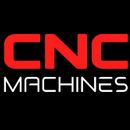What Is Illegal to Make on CNC Machines? A Guide to Staying Compliant in Manufacturing

What Is Illegal to Make on CNC Machines? A Guide to Staying Compliant in Manufacturing
CNC (Computer Numerical Control) machines have revolutionized modern manufacturing, offering precision, speed, and flexibility across countless industries. However, like any powerful tool, CNC technology can be misused. Whether you're a hobbyist or running a full-scale machine shop, it’s important to know what’s illegal to make on CNC machines to avoid serious legal trouble.
In this article, we’ll cover:
- 🔧 Common illegal CNC-manufactured items
- 📜 Laws and regulations governing CNC machining
- 🛑 Risks and penalties for non-compliance
- ✅ Best practices to stay compliant
🔫 1. Firearms and Gun Parts (Without Proper Licensing)
One of the most scrutinized uses of CNC machines is in the manufacturing of firearms and related components.
Illegal Items Include:
- Unserialized "ghost guns"
- Lower receivers (especially AR-15 style) without an FFL license
- Suppressors/silencers without ATF approval
- Machine gun components or conversions
Legal Requirements:
Under U.S. Federal Law (ATF), manufacturing firearms for personal use may be allowed but not for sale, and it must comply with strict guidelines. Selling or distributing any firearm part without a Federal Firearms License (FFL) or proper registration is a federal offense.
💊 2. Counterfeit Medical Devices or Drug Paraphernalia
CNC machines are capable of producing high-precision medical tools and equipment. However, using CNC machines to make unauthorized or counterfeit medical devices, surgical tools, or drug-related paraphernalia (e.g., pill molds, vape cartridges, etc.) is strictly illegal.
Why It’s Illegal:
- Violates FDA regulations under the Food, Drug, and Cosmetic Act
- Endangers public health
- Often linked to illegal drug distribution
💵 3. Counterfeit Currency or Government Items
Creating replicas or close copies of currency, government badges, seals, or military equipment using CNC machines is a violation of federal counterfeiting laws.
Illegal Examples:
- Coins or currency imitations
- Official government/military IDs or emblems
- Fake license plates or VIN plates
These are prosecuted under 18 U.S. Code § 471 and related statutes.
🏍️ 4. VIN Number Tampering or Cloning
CNC machines are sometimes illegally used to re-engrave Vehicle Identification Numbers (VINs) on stolen vehicle parts or cloned frames.
Legal Consequences:
VIN tampering is a felony offense under both federal and state laws, often linked to auto theft rings.
🔐 5. Lock Picking Tools and Burglary Devices
Although locksmiths may use CNC machines to cut keys and tools legally, manufacturing lock-picking tools, bump keys, or burglary instruments without licensing or legitimate purpose can be illegal in many states.
🎮 6. Copyrighted or Trademarked Items
CNC machines are often used for engraving logos, artwork, or parts. But creating replicas of:
- Brand-name products
- Trademarked logos
- Copyrighted artwork or collectibles
without authorization is intellectual property infringement and can lead to lawsuits or criminal charges.
🧨 7. Weaponized Drones or Explosives Components
Using CNC machines to fabricate parts for:
- Improvised explosive devices (IEDs)
- Military-grade drones
- Rocket launchers or components
is not only highly illegal, but it also falls under anti-terrorism laws and could result in lifetime imprisonment.
🛑 Legal Risks and Penalties
Manufacturing illegal items with CNC equipment can lead to:
- Heavy fines (often over $10,000+ per violation)
- Confiscation of equipment
- Federal or state criminal charges
- Loss of business licenses
- Imprisonment
✅ How to Stay Compliant
- Know the Law: Familiarize yourself with local, state, and federal manufacturing laws.
- Register When Required: If you're making regulated items (firearms, medical devices), get the necessary licenses.
- Avoid Gray Areas: If it seems questionable, it’s best not to machine it.
- Consult a Lawyer: When expanding capabilities, always get legal counsel.
- Document Everything: Keep records of what you're producing and for whom.
Conclusion
CNC machines are powerful, but with great precision comes great responsibility. Staying on the right side of the law not only protects your business—it protects your reputation and future. Whether you're machining custom parts or running a full shop, make sure you're always manufacturing legally, ethically, and responsibly.
Need compliant CNC work done? Visit cncmachines.com to connect with licensed, American-based machine shops that follow industry regulations.


